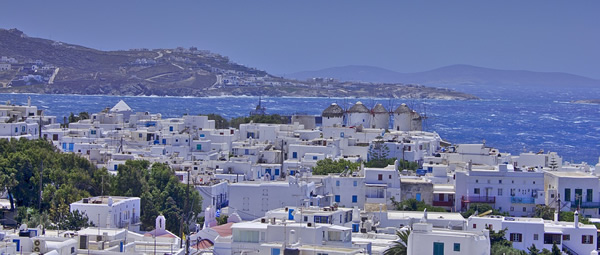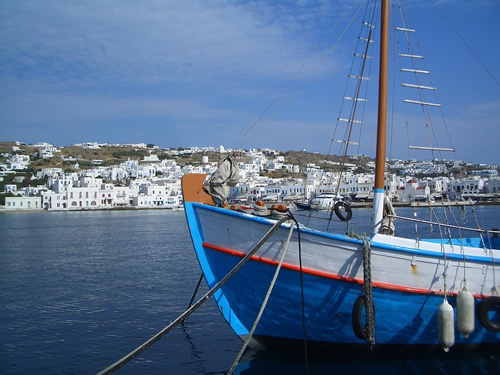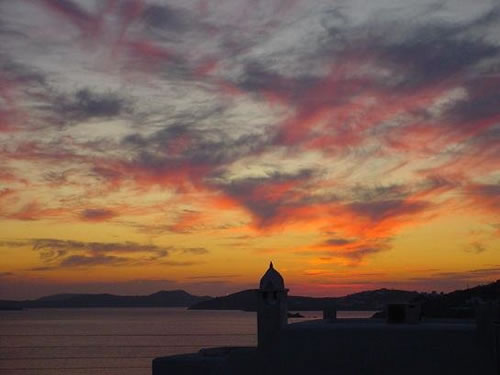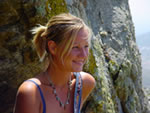Living on the Island of Mykonos
in Greece
By Julia Reynolds

|
|
The town of Mykonos, Greece in all its iconic glory.
|
I wake in my cool, damp little concrete room and momentarily watch the sunlight painting pictures on the walls, diluted and fractured by the heavy grape vine that obscures most of the single window. I rise, stretch, and step out the door of the room I rent in a 200-year-old expanded shepherd shack and walk around to the front of the cottage, as I do every morning, to stare out at the picturesque sprinkling of white confetti houses, red-roofed churches, endless ancient stone walls on rolling hillsides, and the panoramic embrace of the vivid turquoise Aegean Sea that convince me, despite my mind's reluctance to accept my good fortune, I do in fact live on a tiny island in Greece.
It is winter and work is scarce on Mykonos, The island is approximately 45 square miles and 95 miles from Athens, known for its cosmopolitan glamour and vibrant nightlife in the high season, as well as the gorgeous stretches of golden sand beaches. It is December now, and the crowds have long gone, leaving the island free of the noisy blanket of beeping scooters and clustered crowds struggling to make their way through the streets of the diminutive Hora (town), but by no means lacking life. I have decided to adopt my British housemate's philosophy, who, whenever asked what he does for a living, replies: "As little as possible." I have picked up odd jobs and temporary work catch-as-catch-can throughout the slow season. For the last few weeks, I have been painting a hotel overlooking the new port with an all-male, all-Greek, and Albanian work crew.

|
|
Boat moored off of a port in Mykonos.
|
After breakfast, my effortlessly sexy tousle-headed co-worker George picks me up on his motorcycle. We drive to the hotel together for another day of unbelievably relaxed labor, punctuated with numerous coffee and cigarette breaks and an extended mid-day meal with a couple of carafes of wine. We work five or six hours, and I expand my Greek vocabulary daily, learning words for objects like paint thinner and doorknobs. Back at home, around six in the evening, the main event of the day takes place as the entire island catches its breath, walks outside to balconies, doorsteps, and yards, and watches the sky perform a visual symphony of furled ribbons of violet and vast swathes of coral and gold. Winter sunsets in Greece defy the imagination, leaving their audience in awe for 15 minutes each evening.
Falling in Love with the Greek Cylades Islands
I moved to Greece on a whim in 2006 after falling in love at first sight with the islands of the Cyclades and, after that, the rest of the country. The day I laid eyes on Mykonos will be imprinted in Technicolor detail. Here was this tiny whitewashed town clustered in gleaming rows of blue and white around the fishing boat-filled harbor. The light's colors and quality are what I remember most about that moment: blue, white, and blue and white as far as the eye could see. It was a town both antique and dazzlingly new, its narrow, labyrinthine passages hardly deigning to be called streets so enchanting were they in their bougainvillea-drenched mystery. It was like a town from a childhood dream I had long forgotten, where giant pelicans wandered the paths and older women in black fed long lines of stray cats. And the light…my impression was that it was alive, harsh in intensity, yet soothing in its warm caress on the skin. It danced on the water, amongst the cool concrete structures, on the windows of the tavernas, penetrating every crevice, making every reflective surface a beacon. The colors saturated one's brain, so much so that behind the lids of closed eyes, the blues turned violet, and the bright whites left dilating rings.
That moment revealed to me the possibility of a new life. I was entranced with all the Greek islands had to offer: the myriad of visual and visceral delights, the generosity of strangers, a cuisine based around the olives harvested from the trees, the bounty of the sea, produce that knew no pesticide, the language that to me at the time was as foreign and unfathomable as Arabic; and a lifestyle based on the premise that nothing could be put off until after lingering over coffee in the morning, or until after a lengthy lunch in the sunshine on the beach sipping white wine, or maybe simply until avrio (tomorrow).
It was the little things that were hard to pinpoint as well, like noticing the warm air of camaraderie surrounding the fishermen in black hats clustered in the harbor front clicking worry beads or sitting at a table in Kiki's Taverna by Agios Sostis with no electricity overlooking a hidden jewel of a beach with a tree growing in the middle of the dining room, all the food being cooked on a clay grill. Five languages are being spoken at the same table.
I learned that even physical gestures have different meanings in different languages, such as a "tsk" ing sound accompanied by a subtle uplift of the chin in Greek, which means "no." A hand gesture that appeared more like "go away" in my culture actually beckoned "come here" in Greece. The language, as it slowly unraveled its complicated grammar and foreign alphabet to me after months and months of pouring over dictionaries, phrasebooks, language programs, and day-to-day life, revealed perfectly descriptive colloquialisms and words for thoughts, emotions, and qualities that we don't have in English. On a day when the south solid wind caused little ripples of white water undulating in the surrounding waters, they would say, "Ee thalassa ekee arnakia," which translates to mean there are little lambs in the sea, and damned if it didn't look exactly like that. The Greek girls with whom I worked in a beachfront taverna later that year were shocked to hear that we don't have a specific word for the floor of the sea in English. I pondered it for a while but could only repeat, "No, I'm pretty sure we just call it the floor of the sea," somewhat abashedly.
I left Mykonos in 2008 for five months of traveling through Australia, New Zealand, and Southeast Asia. When I returned, it felt smaller and less exciting, and I worked seven days a week for about ten hours a day at a restaurant. I still had time to myself in the mornings, walking to Paranga Beach, taking a long swim, and writing in my notebook for an hour or two before work. Still, I didn't feel as creatively inspired or intellectually stimulated as before, most of my daily conversations being limited by a persistent language barrier. I may have been able to hold a good conversation with my co-workers. Nevertheless, we weren't sharing our hopes, fears, and aspirations in any language. As I observed the misogynistic practices in the restaurant, such as specific tasks always being delegated to the men and others delegated only to the women, I became increasingly frustrated. Eventually, I ended my employment there and left the island again to travel around Europe and collect my thoughts.

|
|
Sunset on the small iconic island of Mykonos, Greece. Photo by Julia Reynolds.
|
On Saying Farewell to Mykonos
Thoughts have been more or less collected. I decided it was time for a change. I moved to Hawaii, where I fell in love with a wonderful man and have lived another seemingly expatriate and sometimes surreal lifestyle for the past two years. We recently returned from another three-month trip to Europe and Morocco, spending most of that time in Greece and Italy. It was my first time returning there, not as a resident but as a tourist. I did experience a trace of nostalgia for the life I had once led in Mykonos. Those mornings, I would walk outside and pinch myself to believe that the universe had granted me this life and these surroundings. The sunsets there top any I have witnessed elsewhere, even the stunning colors the sky puts forth over Waimea Bay on the North Shore of Oahu, where I live now.
Do I have regrets? Not one. The most essential aspect of living in Greece taught me that we have a choice in life. We are not locked into the eight hours a day, five days a week, and one or two weeks of vacation time we are allotted in the United States. There are other options. I'm considering obtaining my certification to teach English as a foreign language this year. The possibilities after that are nearly limitless; I'm considering traveling to Bali, Thailand, and maybe even returning to Greece to try living on another island.
Living in Mykonos taught me that there is no reason not to live somewhere you can walk outside, look around at the loveliness surrounding you, and calmly assure yourself, yes, this beautiful place is where I live. And this is a beautiful life.

|
Julia Reynolds is a waitress and freelance writer living in Hawaii and traveling as much of this incredible world as possible in the short time we are allotted, finding her own meandering path as she goes.
|
|